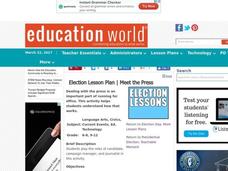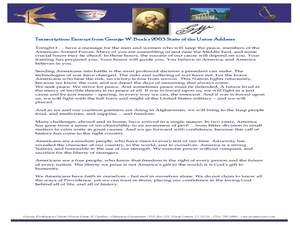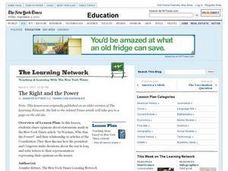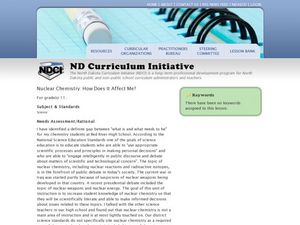Curated OER
The Saturday Night Massacre
Students look at the actions taken by Nixon from several perspectives. They explain the Constitutional issues involved with the firings and the concept of Presidential privilege as it evolved during this period. Students draw conclusions...
Curated OER
The Electoral College
Students read and complete an assignment debating whether the Electoral College should be replaced.
Curated OER
Presidents
Second graders pretend they have just watched a presidential debate and cannot decide which one to vote for. In groups, they also pretend they go back in time to compare and contrast former presidents with the candidates. They use...
Curated OER
Medicare Reform
High schoolers calculate how much of each paycheck is deducted into the Medicare system, explain the need for health insurance and Medicare, and work in small groups to develop their own plan to reform Medicare.
Curated OER
Electing a President
Learners brainstorm and list qualities that they would look for in a president; students rank qualities in order of importance.
Curated OER
Creating Hate: The Power of Words
Students explore why authors choose to use hate words in literature. In this power of words lesson, students complete group participation, journal entries, and written assignments to investigate the use of inflammatory language. Students...
Brown University
Analyzing the News
With so many ways to follow the news today, it is imperative to think critically about the sources of information we are turning to. Here is a fantastic graphic organizer that will help your learners develop the skills to properly...
Stanford University
Iraq Resolution
The 9/11 attacks propelled the United States into a period of low-grade war that has existed from that day all the way to current times. By looking at documents from the decision to send troops to Iraq in 2006, scholars connect the...
Curated OER
Create a Public Opinion Survey: The Middle East in the News
Though the discrete content here is a pair of New York Times articles about a 1998 military strike on Iraq and the coincident impeachment by the House of Representatives of then-President Clinton, this detailed plan for creating,...
Curated OER
Meet the Press
Students participate in a role play revolving around political elections. The roles of candidate, campaign manager, and journalist emphasized in this activity. Students listen to candidate interviews that are available online.
US National Archives
Documented Rights Educational Lesson Plan
How have groups struggled to have their unalienable rights recognized in the United States? Acting as a research team for the Human Rights Council of the United Nations, your young historians will break into groups to research how people...
Curated OER
Inform Your Vote
Students examine and participate in the election process, analyze current event topics and offer their opinions. They then share their viewpoints on civic issues. They are encouraged to do additional research on the election's hot issues.
Curated OER
Indian Removal
Students discuss how the various acts used to force Native Americans from their home. Using the Internet, they compare and contrast the policies toward the Native Americans by presidents through Jackson. They evaluate the impact of...
Curated OER
Youth voters and election turnout
Students investigate why 18- to 24- year-olds have a low turnout at the polls. Students develop a plan to encourage young Americans to vote, or write a persuasive essay telling why they should vote.
Curated OER
George Washington's Foreign Policy
Learners compare George Washington's foreign policy to the policies of presidents who followed him. In this primary source analysis lesson, students compare Washington's Farewell Address to the Roosevelt Corollary, the Monroe Doctrine,...
Curated OER
The Union is Perpetual: Lincoln is Elected
Middle schoolers view primary documents about the race for President in the time of Abraham Lincoln. For this election lesson, students prepare arguments for and against Lincoln using an analysis sheet. Middle schoolers create a poster...
Curated OER
Got the Picture?
Students explore the power of photographic images to influence public opinion. Then, using both news images and personal photographs, they create dual timelines documenting their own life experiences and memories.
Curated OER
The Right and the Power
Students read, discuss and analyze the New York Times article "In Wartime, Who Has the Power?" and relate the article to the Constitution. They then brainstorm how the president and Congress make decisions about the war in Iraq and write...
Curated OER
Cartoons for the Classroom: Humor Helps Hammer a Point Home
In this current events worksheet, learners analyze a political cartoon about the use of ridicule in cartoons and respond to 3 talking point questions.
Curated OER
Campaign Finance Reform and Public Opinion
Students discuss the issue of finance reform in political campaigns. Using the internet, they identify the positives and negatives of finance reform and research the problems associated with campaign fund-raising. They share their...
Curated OER
Nuclear Chemistry: How Does It Affect Me?
Eleventh graders study the different areas of nuclear chemistry. In this energy and critical thinking instructional activity students study radiation, nuclear energy and weapons then divide into groups and create a poster.
Curated OER
Indian Removal in the Age of Jackson
Students compare policies toward Native Americans that were pursued by President Jackson as well as evaluate the impact of assimilation, removal, and resettlement on Native Americans
Curated OER
Who’s Got Rights? An Introduction to Human Rights and Human Rights Defenders
High schoolers explore human rights issues. In this social justice instructional activity, students examine human rights as they read segments of the "Universal Declaration of Human Rights," discuss photographs with human rights...
Curated OER
The Union is Perpetual: Lincoln is Elected
Students take a closer look at the election of Abraham Lincoln. In this historical analysis lesson, students analyze letters, political cartoons, and campaign materials from Lincoln's campaign. Analysis worksheets are included.





